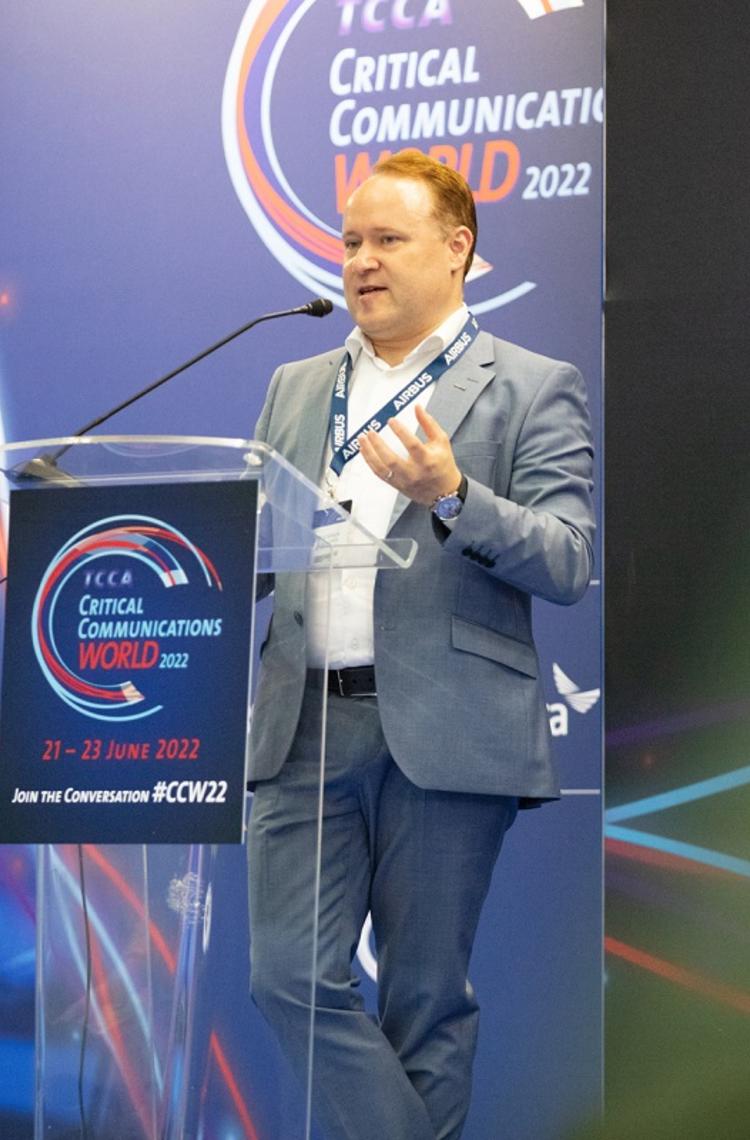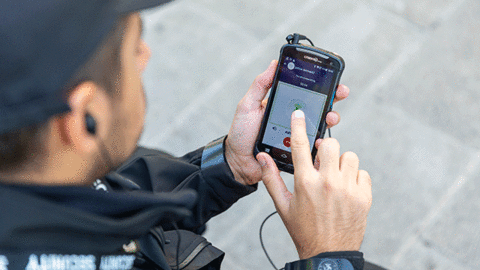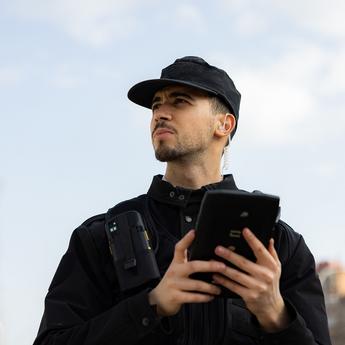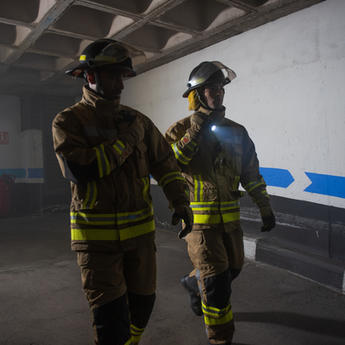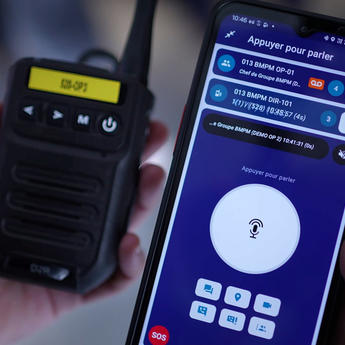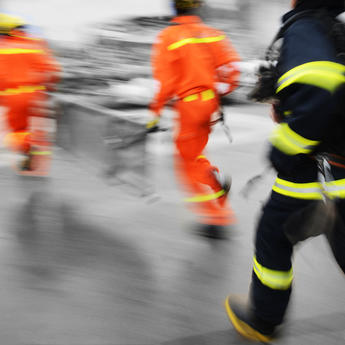Many organizations want to adopt broadband and smartphones for their professional communications. They see it as a good way to improve operational efficiency, safety and security. But what should every organization think about when planning their broadband future? To help you, we’ve collected these quotes about broadband transformation from some of the critical communications industry's leading thinkers.
Critical Communications World (CCW) is the most significant event of the year for any critical communications expert. At this event, expert speakers share their knowledge with us. Some of them provide quotes that we remember for a long time.
This year, I could not visit the CCW event in Vienna. Instead, I listened to the conference presentation recordings after the event. These showed what industry experts think of broadband transformation, and how to do it successfully.
Here are 49 of the most inspiring quotes from the speakers. Please feel free to share your favorites with your colleagues and acquaintances.
- Quotes on broadband future
- Quotes on user needs
- Quotes on security concerns
The most inspiring quotes from the industry’s leading thinkers
Quotes on broadband future
- "There’s no right or wrong way to adopt mission-critical broadband – every country decides for themselves how to do it."
Ari Toivonen, Programme Director, Suomen Erillisverkot - "The biggest challenge is to get started – you need to believe you can do it in a commercial mobile network."
Eetu Prieur, Vice President, Cloud Initiatives, Elisa - "Alongside the rapid change in the security environment, evolving technology provides us with unprecedented opportunities to help meet our common security challenges."
Kirsi Pimiä, Permanent Secretary, Ministry of Interior, Finland - "You should not wait – transforming from narrowband to broadband is tremendous. It’s not only about technology but new ways of working."
Thomas Rehberg, Head of Public Safety Market Segment, Nokia - "It’s not only about technology. It’s about having regulations that help us use it. Many regulations affect innovation."
Nina Myren, Deputy Head of Section, Department for Public Safety Communications, Norwegian Directorate for Civil Protection (DSB) - "In broadband, 4G, 5G and beyond, there is a big opportunity to rethink the information-centric way of working. The limiting factor is not technology, but the culture bound with heritage."
Kirsi Pimiä, Permanent Secretary, Ministry of Interior, Finland - "TETRA and broadband migration is a very complex process – it cannot happen overnight."
Francesco Pasquali, Chair, TETRA Industry Group, TCCA - "We were a bit naïve about how complex this would be. Handheld devices, vehicle PCs, control rooms etc., all have to work together. Creating that seamless experience for the end user is much more complex than we expected."
Cate Walton, Chief Engineer, Deputy Director, Emergency Services Mobile Communications Programme, Home Office - "We should start thinking wider – i.e., how to use this growing amount of data to improve our capabilities and ultimately the overall safety of the operation."
Samuel Gustafsson, Head of sales – Europe, Airbus - "Although we’re already starting to use the new capabilities, we need to challenge ourselves to go even further. Look boldly at future possibilities, instead of replicating old ones on new technology."
Kirsi Pimiä, Permanent Secretary, Ministry of Interior, Finland - "The first use cases for broadband will be the ones we already know. But leaving it there would be a major failure."
Thomas Rehberg, Head of public safety market segment, Nokia - "As well as the transition to mission-critical broadband, there will also be a lot of evolution alongside that. The biggest benefit is not just more bandwidth but about evolving the intelligent ecosystem. Getting more bandwidth and doing the same thing would be a waste of investment."
Samuel Gustafsson, Head of sales – Europe, Airbus - "There is a dilemma between mission-critical and agility – after all, you don’t want to fail fast in mission-critical. You could perhaps experiment with a solution that is not mission-critical – if the solution is good and useful, it might become so later on."
Nina Myren, Deputy Head of Section, Department for Public Safety Communications, Norwegian Directorate for Civil Protection (DSB) - "As pioneers we don’t have anyone to ask – we have to learn by doing."
Kari Junttila, Development Manager, Suomen Erillisverkot Group - "No-one can make it alone – success comes from co-operation."
Kirsi Pimiä, Permanent Secretary, Ministry of Interior, Finland - "We need to make sure our next generation crisis communication systems are compliant to other European systems."
Gunnel Helmers, Special Adviser at the Norwegian Directorate for Civil Protection (DSB) - "Public safety organizations should be trialing IoT to make operations better. Don’t wait for the perfect IoT product, as a lot is already possible today."
Samuel Gustafsson, Head of sales – Europe, Airbus - "Building the future is always a long-term activity. Developing critical communication is not a project but a continuous task."
Kirsi Pimiä, Permanent Secretary, Ministry of Interior, Finland - "Public safety needs to get into the habit of continuous development. You don’t want to build something now and then keep it the same for 20 years."
Ari Toivonen, Programme Director, Suomen Erillisverkot - "One great success we can celebrate today is that we have gone from multiple technologies into one. We’re all globally in 3GPP, which is already a huge achievement for standardization."
Tero Pesonen, Vice Chair, TCCA & Chair, CCBG, TCCA
Quotes on user needs
- "We have evolved from analogue to digital and now broadband. What has never changed are the basic needs of mission-critical communications – it must be trusted by users and always be available everywhere."
Francesco Pasquali, Chair, TETRA Industry Group, TCCA - "Technology transition needs to be user-centric. Mission-critical communication is critical for a reason. Without it, society is in jeopardy."
Kirsi Pimiä, Permanent Secretary, Ministry of Interior, Finland - "The key driver of the change is not moving from one technology to another, but to bring more safety to first responders and the whole society."
Samuel Gustafsson, Head of sales – Europe, Airbus - "Making sure that end users are involved is one of our key challenges. We can’t wait until the solution is in place and start trying then. We need their support right now and their input to our project."
Ronny Harpe, Head of Rakel, Swedish Civil Contingencies Agency, MSB - "It’s very important to get user organizations on board at the start. We have a saying: “If you don’t participate, you won’t get what you need."
Kari Junttila, Development Manager, Suomen Erillisverkot Group - "Why do we do it? It’s all about the users. If they don’t like it, I’ve done something wrong."
Dimitri Gilissen, Program Director, NOOVA, Ministry of Justice and Security, Netherlands - "The users should be more involved in building the new solutions. In this way, the solutions will meet the requirements of users in the field, helping them do their everyday work of saving lives."
Gunnel Helmers, Special Adviser at the Norwegian Directorate for Civil Protection (DSB) - "Everything boils down to trust – if your users can’t trust the service, they won’t use it."
Ari Toivonen, Programme Director, Suomen Erillisverkot - "When adopting broadband for public safety organizations, the big question is about trust and is it safe enough."
Berit Isaksen, Legal Department, Norwegian Directorate for Civil Protection (DSB) - "Current TETRA has proven itself over the years. Similarly, police officers, fire fighters and paramedics who risk their lives need to know they can trust new technology, new tools and the new ways of working."
Kirsi Pimiä, Permanent Secretary, Ministry of Interior, Finland - "A mission-critical service or network must work 7 days a week, 24 hours a day, 365 days a year. It has to work, full stop."
Ari Toivonen, Programme Director, Suomen Erillisverkot - "When bringing 5G broadband into mission-critical use, the biggest challenge is, is it going to work when you need it most."
Ryan Burchnell, Director, Market Strategy & Development, AT&T – FirstNet - "With a mission-critical public safety network, people’s lives depend on it – every part needs to work together whenever you need it."
Richard Harrap, Managing Director, Emergency Services Network, EE/BT - "People see technology developing quickly in their private lives, but for mission critical users, it takes more time. It must solve a problem and must be available all the time, everywhere."
Nina Myren, Deputy Head of Section, Department for Public Safety Communications, Norwegian Directorate for Civil Protection (DSB) - "We cannot switch off the TETRA network until we have a system that end users can rely on."
Sofia Enlund, Head of business support section, department of cyber security and secure communications, Swedish Civil Contingencies Agency, MSB - "Don’t throw away your old shoes until the new ones actually fit – i.e., don’t phase out TETRA until the new system actually works."
Dimitri Gilissen, Program Director, NOOVA, Ministry of Justice and Security, Netherlands - "The new generation of first responders and police officers don’t understand why the criminal has a better tool than them. They will not accept this."
Thomas Rehberg, Head of public safety market segment, Nokia - "Youngsters are at the forefront of using mobile broadband services – public safety needs to follow their lead."
Jarmo Vinkvist, COO, Suomen Erillisverkot
Quotes on security concerns
- "Security cannot be an afterthought. 5G networks will evolve. You need to know what’s in your network (risks and threats) and continuously improve."
Nils Ahrlich, Head of Security Consulting Practice, Nokia - "Cyber security threats are like war. You need to practice and be prepared for the next hacking before the crisis hits."
Urmas Ruuto, Chief of Technology Branch, NATO Cooperative Cyber Defence Centre of Excellence (CCDCOE) - "There’s a lot happening with connected objects outside the public safety domain. This is the ultimate challenge – how can you connect all these domains and create a total safety concept."
Samuel Gustafsson, Head of sales – Europe, Airbus - "As private citizens we often choose usefulness of the service over control of our data and information – for mission-critical services, we need to think different."
Nina Myren, Deputy Head of Section, Department for Public Safety Communications, Norwegian Directorate for Civil Protection (DSB) - "The biggest risk to information security is the user. But if it’s in the cloud, there are modern tools you can use to identify unusual behavior much more quickly."
David Bailey, Digital Engagement Manager, Police Digital Service - "Not all data is the same and should be treated accordingly. Some data may need to be protected in specific data centers, for example, while other data can be loaded to a public cloud."
Mika Myllymäki, Solution Business Manager, Airbus - "Sometimes we confuse ourselves with data impact assessments. We start assessing the tool, not the data. Organizations think we cannot use this tool, because the data could be processed outside the country or in a particular geographic location. This is a bit silly, as the data that we want to use with that tool can be used. It really depends on what kind of data it is."
David Bailey, Digital Engagement Manager, Police Digital Service - "How do we deal with cyber threats? The main thing is to do it systematically. Audit your assets and have an up-to-date security policy that is well understood by everyone, and monitor threats."
David Firth, Crypt Security Consultant, National Cyber Security Centre, UK - "How do we get started with data? Start with some data that’s classified to use on the public cloud. Collect experience using that, then you can expand to other areas."
Mika Myllymäki, Solution Business Manager, Airbus - "Access to huge amounts of data will allow us to make a better analysis. But working out how to store, categorize, manage and use that data will be a major issue for us all. We are going to have an awful lot of data waste."
Kylie De Courteney, Managing Director, NSW Telco Authority - "The threats are the same in public clouds, they are just managed differently. For example, leaving a USB on the train is a data loss, like somebody intruding to the cloud. But the cloud is more secure because you can limit the access."
David Bailey, Digital Engagement Manager, Police Digital Service
Looking forward to next year
Whether you have started your broadband journey or don’t know where to start, these quotes will help you ensure a better broadband future. Those who keep learning and growing often find success. And what is a better place to learn than the Critical Communications World (CCW) event?
Don’t miss this opportunity to meet, network and above all, learn about the latest developments in mission-critical broadband. In the meantime, these quotes from CCW 2022 are available for you – please feel free to share the ones that most inspire you.
If you are planning on building your public safety broadband, you may also be interested in downloading this white paper “How to plan your migration from TETRA to 4G/5G mission critical broadband.”
You’ll learn how public safety organizations and enterprises can benefit from mission critical broadband now. You’ll also discover the opportunities and the risks, the do's and dont's – and see how your broadband migration could be a success. Download the white paper now:
